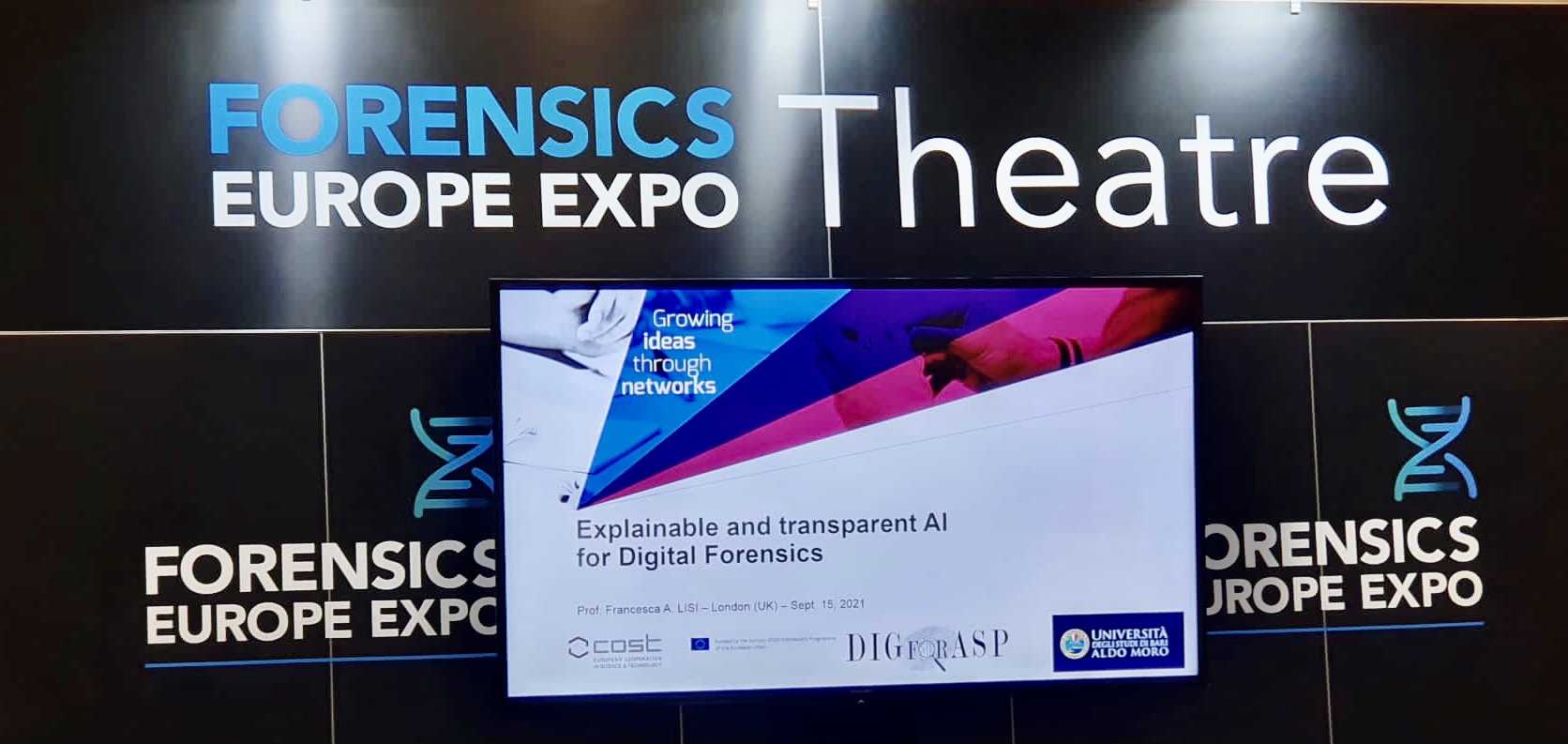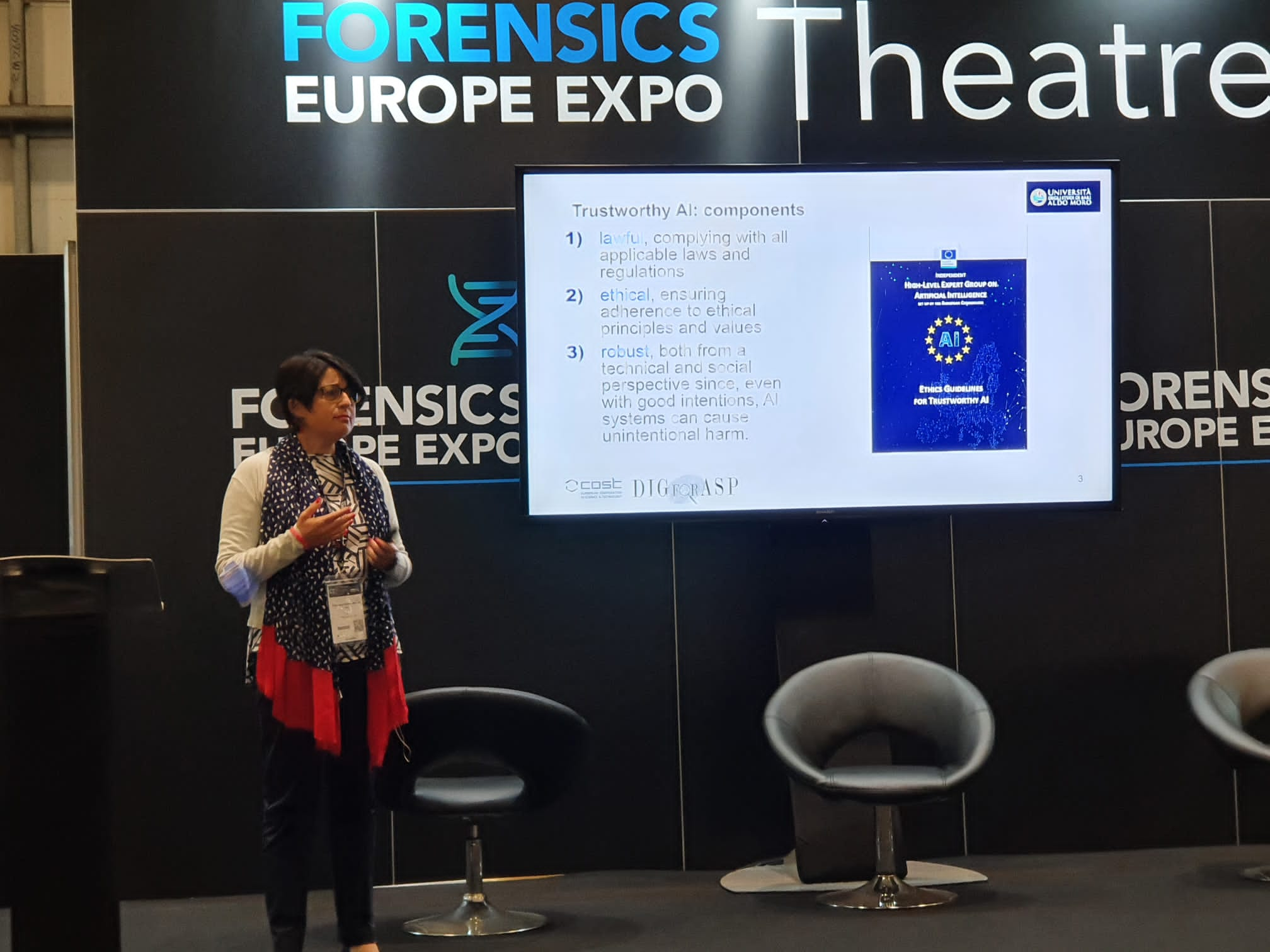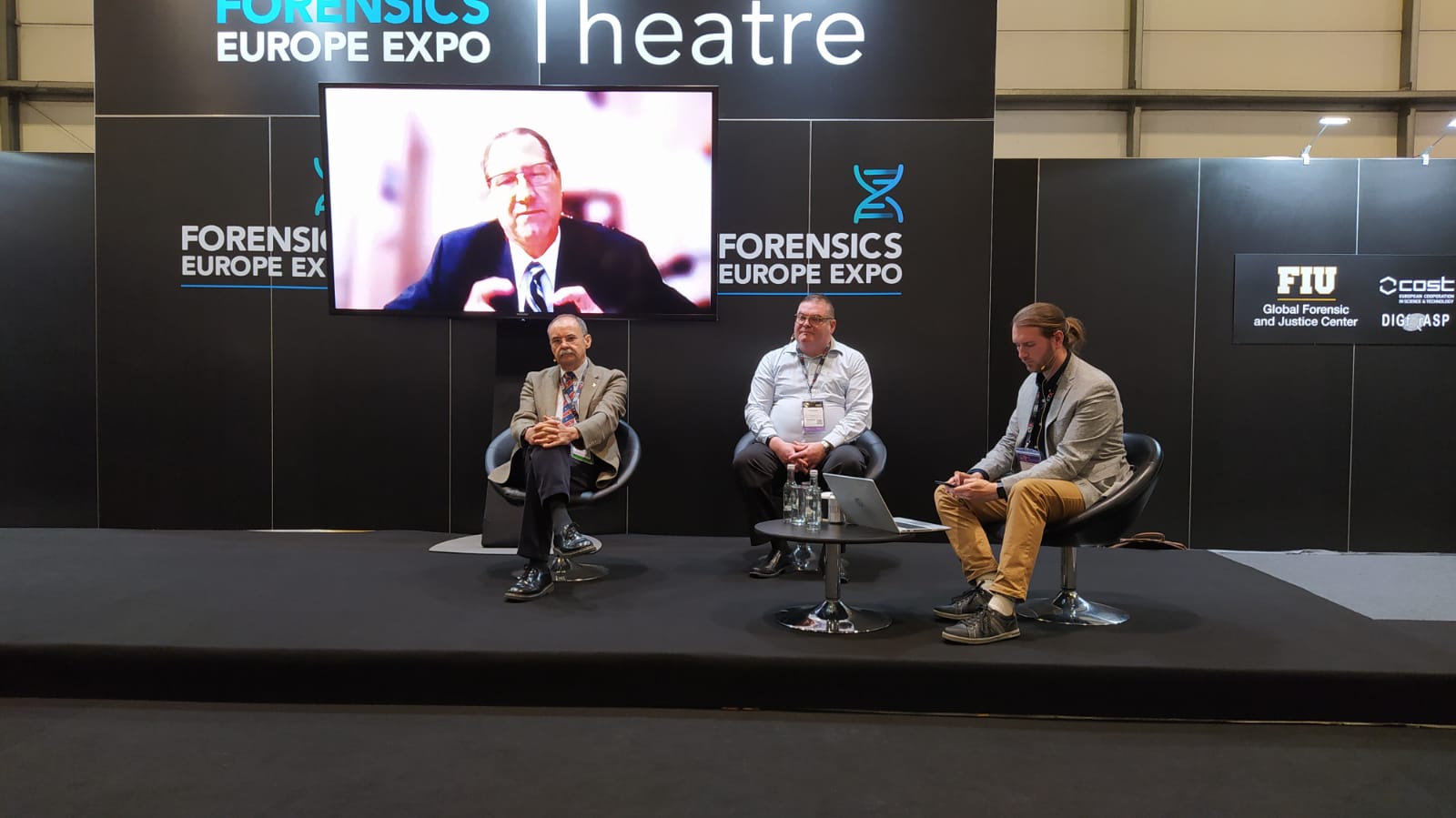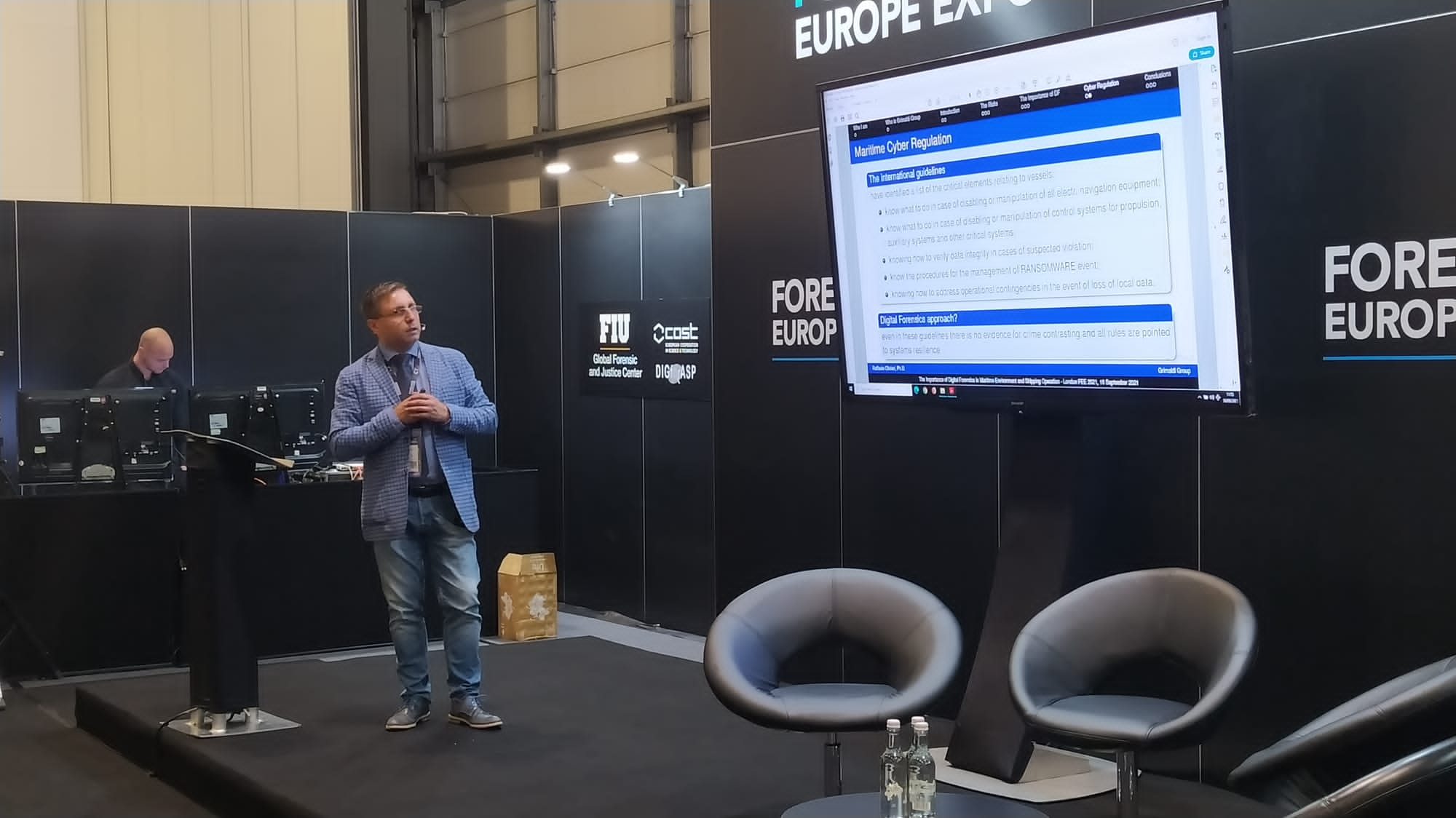Focused thematic WG1- FEE conference 2021

On 14-16 September 2021 a Focused Thematic Working Group Meeting (WG1: Digital Forensics requirement analysis) will be held in London (United Kingdom), and also in the same week of the Forensics Europe Expo (FEE).
Focused thematic WG1
| # | Grant Period Goals | Grant Period Activities | Grant Period Outputs |
|---|---|---|---|
|
G1. Continue introducing researchers in AI and Automated Reasoning to the main issues and problems in the daily work of digital forensics scientists and the technical, legal and criminological aspects they involve. (O1, O7)
G2. Identify more relevant test data for researching. Define more challenges to encourage to researchers in AI and Automated Reasoning to develop some solutions. (O2, O5) G4. Continue creating synergies between Digital Forensic Challenges and AI and AR. (O3 and O4) G8. Increase the number of ITC and NNC countries in the Action. (O1, O2, O3, O4, O9) G9. Involve more international and national institutions (related to security in each country) in the Action (O1, O2, O3, O4, O9) G10. Disseminate the details and objectives of the Action (O2, O3, O4, O9) |
Within and across working groups there is a need for short, intensive meetings to provide materials that will contribute to the planning of future activities and the deliverables and goals of the Grant Period and beyond. With this in mind, we propose the following activity: Focused Thematic Working Group Meetings Format: Short, 2-day, intensive working meetings comprising 4-6 participants. Although the meetings will be organized within the area of a WG, due to the nature of the Working Group topics and the close interaction between them, we may expect participants to come from more than one WG. WG leaders and co-leaders will propose a theme and list of participants for approval by the MC. | Focused thematic working group meetings have three main objectives: 1. To prepare materials and draft deliverables that contribute to the goals of the WG for the present or coming period. 2. Suggest targets to be achieved in the coming Grant Period 4. Propose activities that will contribute to achieving targets in the coming and future periods. The outcomes of each meeting will be made available to all WG participants for discussion and will be presented at coming Core Group and MC meetings. |
Forensics Europe Expo (FEE)
The FEE conference is spanning FEE’s four key pillars providing the latest insights on developments in the forensics industry. Take a look at the conference agenda below which addresses the 2021 theme across three days (https://www.forensicseuropeexpo.com/2021-agenda).
The DigForASP Cost Action will have a total of 7 speakers at this conference:
Francesca Alessandra Lisi (Explainable and transparent AI for Digital Forensics)
Francesca A. Lisi, PhD in Computer Science, is currently an Associate Professor at the Dept. of Computer Science of the University of Bari (Italy). Since her PhD studies, she has been interested in the cross-fertilization of results obtained in different areas inside AI and also outside AI, notably in databases. She has investigated several logic-based methods for Machine Learning and Data Mining, with applications ranging from Geographical Information Systems to Ontologies and the Semantic Web. She is (co-)author of about 100 scientific articles published in journals and peer-reviewed conference proceedings. She serves as PC member in major international AI conferences such as IJCAI, AAAI and ECAI. She has co-chaired several events for AI specialists, and contributed to the dissemination of AI-related scientific knowledge and to the debate around socio-ethical implications of AI, by organizing or participating in public events and by working with the media (press, blogs, radio).
Francesca is elected board member of the Italian Association for Artificial Intelligence (AIxIA) since 2013, and of the Italian Chapter of the Association for Logic Programming (GULP) since 2009. She is substitute member for Italy in the Management Committee of the following COST Actions: “DigForASP – Digital forensics: evidence analysis via intelligent systems and practices” (2018-2022) and “EUGAIN – European Network For Gender Balance in Informatics” (2020-2024). In DigForASP she plays also the role of Science Communication Manager.
Zeno Geradts (Keynote Panel: Harnessing emerging technologies for forensics and criminal justice)
Zeno Geradts is a senior forensic scientist at the Netherlands Forensic Institute of the Ministry of Security and Justice at the Forensic Digital Biometrics Traces departement. He is expert witness in the area of forensic (video) image processing and biometrics such as manipulation detection on deepfakes. Within the team Forensic Big Data Analysis he works in research on artificial intelligence on text, images and video. He worked within the European Project ASGARD on Forensic big data analysis. He was President of the American Academy of Forensic Science 2019-2020 and chairman of the ENFSI Forensic IT Working group. Since 2014, he is full professor on Forensic Data Science by special appointment at the University of Amsterdam for 1 day a week. He is active in forensic science since 1991 and has received several awards including the Distinguished Forensic Scientist award from ENFSI in 2012.
Aleksander Jevremovic (Human-computer interaction, security, and forensics)
Aleksandar Jevremovic is a full professor at the Faculty of Informatics and Computing, Belgrade, Serbia, a guest lecturer at Harvard University in Cambridge, MA, external consultant at American Public University System, and a visiting research fellow at the Cyprus Interaction Lab, Limassol, Cyprus. So far, he has authored/co-authored a number of research papers and made contributions to three books about computer networks, computer network security and Web development. He is recognized as an Expert Level Instructor at Cisco Networking Academy program. Since 2018. He serves as a Serbian representative at the Technical Committee on Human-Computer Interaction of the UNESCO International Federation for Information Processing (IFIP).
Slides: Human Computer Interaction Security And Forensics ALEKSANDAR
Marko Krstic PhD (Digital Forensics Readiness of Child Online Protection AI-based Applications)
Marko Krstic received bachelor, master and PhD degrees in Electrical and Computer Engineering from School of Electrical Engineering (ETF), University of Belgrade. Since August 2013 until 2018 he worked at Regulatory Agency for Electronic Communications and Postal Services (RATEL) as Advisor in IT department and then from 2018 until 2020 as Senior Cyber Security Advisor at Serbian National Computer Emergency Team. He is currently part of European Innovation Associate Program, within which he is finishing his PostDoc studies. Beside everyday working activities, he actively participate in the working group 1 of COST CA17124 action Digital forensics: evidence analysis via intelligent systems and practices. He is chosen as Management Committee Substitute for COST CA18115 action Transnational Collaboration on Bullying, Migration and Integration at School Level.
Slides:
Ivana Stajner-Papuga (Mathematics tools for digital forensics)
Ivana Štajner-Papuga is a full professor at the Department of Mathematics and Informatics, Faculty of Sciences, University of Novi Sad. Her fields of interest are Fuzzy Systems; Decision Making Theory; Aggregation Operators; Measure Theory – non-additive set functions; Statistics. She is a coauthor of more than 20 scientific paper published in international journals with high IF, h-index is 9 (SCOPUS), and the total number of citations is 300 (SCOPUS). Ivana Štajner-Papuga participated with presentations in over 30 international conferences and is the Technical Program Committee Chair for the IEEE International Symposium on Intelligent Systems and Informatics from 2013. She is a reviewer for the following international journals with high IF: Fuzzy Sets and Systems, Knowledge-Based Systems, Journal of Inequalities and Applications, Soft Computing, Information Sciences, Fuzzy Optimization and Decision Making, ComSIS.
As a researcher and guest lecturer, she has realized mobility at several universities. Currently, she is a participant at projects DigForAsp (Digital forensics: evidence analysis via intelligent systems and practices) CA17124 funded by the European Cooperation in Science and Technology (COST), and An interdisciplinary approach to mathematical education – InAMath, 2020-1-HR01-KA201077816.
Slides: London 2021 Slide IVANA
Rafaele Olivieri (The importance of digital forensics in the maritime environment and shipping)
Ph.D. in Information Engineering and Computer Science at the University of L’Aquila. After over 26 years spent in the Italian Carabinieri, of which 20 years in the Digital Forensics department of RaCIS, from October 2020 I am Cyber Security Manager of the Grimaldi Group (multinational operating in the maritime transport sector and logistics). I am one of the main proponents of the European project Cost Action DigForASP CA17124 (“Digital forensics: evidence analysis via intelligent systems and practices”), aimed to study and develop new techniques based on Artificial Intelligence for Digital Forensics and Investigations. Working Group Leader of the “WG1: Digital Forensics requirement analysis” within the project DigForASP CA17124.
Stefania Constantini (Epistemic Logic and Theory of Mind for Modelling Group Dynamics of Criminal Organizations)
Stefania Costantini. MSc “cum Laude”, University of Pisa (1983). From 2005, Full Professor at the DISIM Department, University of L’Aquila. Research Interests: Artificial Intelligence. (Co-)Author of more than 150 International publications. Member of the Program Committee of the most important conferences in the fields, three times (Co-)Chair, General Chair of PAAMS2020, member of the Editorial Board of the journal “Theory and Practice of Logic Programming”. President of GULP (Italian Association of Computational Logic). Member of the Steering Committee of AIxIA (Italian Association of Artificial Intelligence). Coordinator for L’Aquila of the National Lab CINI AIIS (Artificial Intelligence and Intelligent Systems). Evaluator for EU, Italian Ministry, Italian and foreign Univerities and Institutions. Invited visiting professor: University of Texas at El Paso; Imperial College London; Universidad Politecnica de Madrid and Corunna University; Fundacion Univ. de las Americas, Puebla (MX). Projects: Vice-Coordinator of Action COST CA17124 “DIGital FORensics: evidence Analysis via intelligent Systems and Practices”, UNIVAQ Node Coordinator in WASP (Working Group on Answer Set Programming, IST-FET-2001-37004) and CUSPIS (a Cultural Heritage Space Identification System, GJU/05/2412/CTR/CUSPIS). Participant in several European, Italian and industrial projects. At the University of L’Aquila: member of the Steering Committee of the PhD Program in ICT; member of the Quality Assurance Committee; 2011-2014, Coordinator of the PhD Program in Computer Science; 2013-2015, Director of BSc and MSC tracks in Computer Science; 2009-2011, vice-Director of the Computer Science Department. Lecturer for courses: Intelligent Artificial Agents, Ontologies for Data Representation: Methods and Applications, Automated Reasoning, in the MSc track in Computer Science.
Slides: Slides FEE 2021 STEFANIA




Venue: Excel London
Location: https://goo.gl/maps/8WHcizwA9sfMPcGg7
Press note: Press Note London

